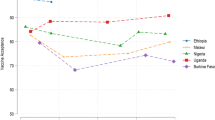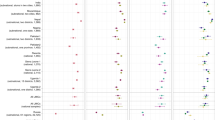Abstract
In Taiwan, hesitancy regarding COVID-19 vaccination centered more on the choice of vaccine brand than on the decision to vaccinate. However, there is limited research exploring the factors influencing COVID-19 vaccine brand preferences from a sociopolitical perspective. Thus, we aimed to examine how Taiwanese national identity and trust in government influence vaccination status and vaccine brand choice, using longitudinal data from 2020, 2021, and 2023. This study utilized data from the Taiwan Panel Study of Family Dynamics 2020 survey, and combined it with data from two self-administered surveys conducted in 2021 and 2023. We focused on four vaccines commonly administered in Taiwan: AstraZeneca, Moderna, Pfizer-BioNTech, and the domestically-developed Medigen. Using Poisson regression models with robust standard errors, we assessed the effects of national identity and trust in government on the choice of COVID-19 vaccine brand. By analyzing data from 2361 participants, we found that national identity and trust in government were associated with the likelihood of COVID-19 vaccination, the number of vaccine doses received, and the brand of vaccine taken. Those who identified themselves as Taiwanese were more inclined to receive the Medigen and AstraZeneca vaccines, but less willing to receive Pfizer-BioNTech vaccine. Those who trusted the government were more likely to prefer and receive the Medigen vaccine. Conversely, those who didn’t trust the government were less likely to prefer Medigen and AstraZeneca vaccines, but were willing to receive Pfizer-BioNTech vaccine. Vaccine brand preferences and uptake in Taiwan were affected by individuals’ national identity and their trust in government. This highlights the critical role of sociopolitical factors in shaping public health strategies.

Similar content being viewed by others
References
Steinbrook, R. (2021). Lessons from the success of COVID-19 control in Taiwan. JAMA Internal Medicine, 181, 922. https://doi.org/10.1001/jamainternmed.2021.1625
Summers, J., Cheng, H.-Y., Lin, H.-H., Barnard, L. T., Kvalsvig, A., Wilson, N., & Baker, M. G. (2020). Potential lessons from the Taiwan and New Zealand health responses to the COVID-19 pandemic. The Lancet Regional Health—Western Pacific. https://doi.org/10.1016/j.lanwpc.2020.100044
Wang, C. J., Ng, C. Y., & Brook, R. H. (2020). Response to COVID-19 in Taiwan: Big data analytics, new technology, and proactive testing. JAMA, 323, 1341–1342. https://doi.org/10.1001/jama.2020.3151
Yen, M.-Y., Yen, Y.-F., Chen, S.-Y., Lee, T.-I., Huang, K.-H., Chan, T.-C., Tung, T.-H., Hsu, L.-Y., Chiu, T.-Y., Hsueh, P.-R., & King, C.-C. (2021). Learning from the past: Taiwan’s responses to COVID-19 versus SARS. International Journal of Infectious Diseases, 110, 469–478. https://doi.org/10.1016/j.ijid.2021.06.002
Fernández-Villaverde, J., & Jones, C. I. (2020). Macroeconomic outcomes and COVID-19: A progress report. National Bureau of Economic Research.
Dyer, O. (2021). Covid-19: Variants are spreading in countries with low vaccination rates. BMJ, 373, n1359. https://doi.org/10.1136/bmj.n1359
Wu, C.-H., Chou, Y.-C., Lin, F.-H., Hsieh, C.-J., Wu, D.-C., Peng, C.-K., & Yu, C.-P. (2021). Epidemiological features of domestic and imported cases with COVID-19 between January 2020 and March 2021 in Taiwan. Medicine, 100, e27360. https://doi.org/10.1097/MD.0000000000027360
Sheng, W.-H., Hsieh, S.-M., & Chang, S.-C. (2023). Achievements of COVID-19 vaccination programs: Taiwanese perspective. Journal of the Formosan Medical Association. https://doi.org/10.1016/j.jfma.2023.04.017
Lee, Y.-C., & Wu, W.-L. (2023). Key drivers of COVID-19 vaccine hesitancy: A perspective of collectivism. Healthcare, 11, 176. https://doi.org/10.3390/healthcare11020176
Guan, C.-Y., Tsai, S.-H., Fan, J.-S., Lin, Y.-K., & Kao, C.-C. (2022). Middle-age Asian male with cerebral venous thrombosis after COVID-19 AstraZeneca vaccination. American Journal of Emergency Medicine, 51, 427. https://doi.org/10.1016/j.ajem.2021.07.011
Li, S.-Y., Chen, H.-H., Liu, P.-Y., Shi, Z.-Y., Lin, Y.-H., Tsai, C.-A., & Lin, S.-P. (2022). Case report of acute encephalitis following the AstraZeneca COVID-19 vaccine. International Journal of Rheumatic Diseases, 25, 950–956. https://doi.org/10.1111/1756-185X.14372
Latkin, C. A., Dayton, L., Yi, G., Konstantopoulos, A., & Boodram, B. (2021). Trust in a COVID-19 vaccine in the US: A social-ecological perspective. Social Sciences & Medicine, 270, 113684. https://doi.org/10.1016/j.socscimed.2021.113684
Yuan, Y., Yeo, S. Y., & Lee, K. S. (2024). Different roles of interpersonal trust and institutional trust in motivating older adults to receive COVID-19 vaccines in Singapore. Social Science and Medicine, 340, 116475. https://doi.org/10.1016/j.socscimed.2023.116475
Silver, A. (2021). Why Taiwan approved its own vaccine before phase III trials. BMJ, 374, n2104. https://doi.org/10.1136/bmj.n2104
Lin, A.M.-W., & Wu, C. (2023). Party identification, ambivalence, and the issue of vaccine procurement in Taiwan. Journal of Asian and African Studies, 58, 232–248. https://doi.org/10.1177/00219096221137675
Schaffer DeRoo, S., Pudalov, N. J., & Fu, L. Y. (2020). Planning for a COVID-19 vaccination program. JAMA, 323, 2458–2459. https://doi.org/10.1001/jama.2020.8711
Goldenberg, M. J. (2021). Vaccine hesitancy: Public trust, expertise, and the war on science. University of Pittsburgh Press.
Chiang, C.-F., Kuo, J., & Liu, J.-T. (2022). Cueing quality: Unpacking country-of-origin effects on intentions to vaccinate against COVID-19 in Taiwan. Social Science and Medicine, 314, 115403. https://doi.org/10.1016/j.socscimed.2022.115403
Gotanda, H., Miyawaki, A., Tabuchi, T., & Tsugawa, Y. (2021). Association between trust in government and practice of preventive measures during the COVID-19 pandemic in Japan. Journal of General Internal Medicine, 36, 3471–3477. https://doi.org/10.1007/s11606-021-06959-3
Pak, A., McBryde, E., & Adegboye, O. A. (2021). Does high public trust amplify compliance with stringent COVID-19 government health guidelines? A multi-country analysis using data from 102,627 individuals. Risk Management and Healthcare Policy, 14, 293–302. https://doi.org/10.2147/RMHP.S278774
Shanka, M. S., & Menebo, M. M. (2022). When and how trust in government leads to compliance with COVID-19 precautionary measures. Journal of Business Research, 139, 1275–1283. https://doi.org/10.1016/j.jbusres.2021.10.036
Van Bavel, J. J., Cichocka, A., Capraro, V., Sjåstad, H., Nezlek, J. B., Pavlović, T., Alfano, M., Gelfand, M. J., Azevedo, F., Birtel, M. D., Cislak, A., Lockwood, P. L., Ross, R. M., Abts, K., Agadullina, E., Aruta, J. J. B., Besharati, S. N., Bor, A., Choma, B. L., … Boggio, P. S. (2022). National identity predicts public health support during a global pandemic. Nature Communications, 13, 517. https://doi.org/10.1038/s41467-021-27668-9
Barceló, J., Sheen, G.C.-H., Tung, H. H., & Wu, W.-C. (2022). Vaccine nationalism among the public: A cross-country experimental evidence of own-country bias towards COVID-19 vaccination. Social Science and Medicine, 310, 115278. https://doi.org/10.1016/j.socscimed.2022.115278
Trent, M., Seale, H., Chughtai, A. A., Salmon, D., & MacIntyre, C. R. (2022). Trust in government, intention to vaccinate and COVID-19 vaccine hesitancy: A comparative survey of five large cities in the United States, United Kingdom, and Australia. Vaccine, 40, 2498–2505. https://doi.org/10.1016/j.vaccine.2021.06.048
Van Oost, P., Yzerbyt, V., Schmitz, M., Vansteenkiste, M., Luminet, O., Morbée, S., Van Den Bergh, O., Waterschoot, J., & Klein, O. (2022). The relation between conspiracism, government trust, and COVID-19 vaccination intentions: The key role of motivation. Social Science and Medicine, 301, 114926. https://doi.org/10.1016/j.socscimed.2022.114926
Chang, M. (2003). On the origins and transformation of Taiwanese national identity. In P. R. Katz & M. A. Rubinstein (Eds.), Religion and the formation of Taiwanese identities (pp. 23–58). Palgrave Macmillan. https://doi.org/10.1057/9781403981738_2
Liao, D.-C., Chen, B., & Huang, C. (2013). The decline of “Chinese Identity” in Taiwan?! An analysis of survey data from 1992 to 2012. East Asia, 30, 273–290. https://doi.org/10.1007/s12140-013-9198-3
Wang, A.H.-E., Yeh, Y.-Y., Wu, C. K. S., & Chen, F.-Y. (2023). Why does taiwan identity decline? Journal of Asian and African Studies. https://doi.org/10.1177/00219096231168068
Ong, A. K. S., Prasetyo, Y. T., Lagura, F. C., Ramos, R. N., Salazar, J. M. L., Sigua, K. M., Villas, J. A., Chuenyindee, T., Nadlifatin, R., Persada, S. F., & Thana, K. (2022). Young adult preference analysis on the attributes of COVID-19 vaccine in the Philippines: A conjoint analysis approach. Public Health Practice, 4, 100300. https://doi.org/10.1016/j.puhip.2022.100300
Lin, C.-Y., Fan, C.-W., Ahorsu, D. K., Lin, Y. C., Weng, H.-C., & Griffiths, M. D. (2022). Associations between vaccination and quality of life among Taiwan general population: A comparison between COVID-19 vaccines and flu vaccines. Human Vaccines & Immunotherapeutics, 18, 2079344. https://doi.org/10.1080/21645515.2022.2079344
Wang, C.-W., de Jong, E. P., Faure, J. A., Ellington, J. L., Chen, C.-H.S., & Chan, C.-C. (2022). A matter of trust: A qualitative comparison of the determinants of COVID-19 vaccine hesitancy in Taiwan, the United States, the Netherlands, and Haiti. Human Vaccines & Immunotherapeutics, 18, 2050121. https://doi.org/10.1080/21645515.2022.2050121
Lee, H.-W., Leng, C.-H., & Chan, T.-C. (2022). Determinants of personal vaccination hesitancy before and after the mid-2021 COVID-19 outbreak in Taiwan. PLoS ONE, 17, e0270349. https://doi.org/10.1371/journal.pone.0270349
Lo, S.-Y., Li, S.-C.S., & Wu, T.-Y. (2021). Exploring psychological factors for COVID-19 vaccination intention in Taiwan. Vaccines, 9, 764. https://doi.org/10.3390/vaccines9070764
Viskupič, F., Wiltse, D. L., & Meyer, B. A. (2022). Trust in physicians and trust in government predict COVID-19 vaccine uptake. Social Science Quarterly, 103, 509–520. https://doi.org/10.1111/ssqu.13147
Ho, K., Clarke, H. D., Chen, L.-K., & Weng, D.L.-C. (2013). Valence politics and electoral choice in a new democracy: The case of Taiwan. Elect. Stud. Economics and Elections: Effects Deep and Wide, 32, 476–481. https://doi.org/10.1016/j.electstud.2013.05.012
Zou, G. (2004). A modified poisson regression approach to prospective studies with binary data. American Journal of Epidemiology, 159, 702–706.
Council on Foreign Relations. (2021). Taiwan Confronts A Serious Vaccine Shortage. Retrieved October 12, 2023, from https://www.cfr.org/blog/taiwan-confronts-serious-vaccine-shortage
BBC News. (2021). Covid: Taiwan rolls out homegrown vaccine amid criticism. BBC News. Retrieved October 12, 2023, from https://www.bbc.com/news/world-asia-58301573
Reuters. (2021a). BioNTech COVID-19 vaccines coming to Taiwan, Chinese agent says. Reuters. Retrieved October 12, 2023, from https://www.reuters.com/world/asia-pacific/tsmc-says-it-is-process-signing-deal-biontech-covid-19-vaccines-2021-07-11/
Reuters. (2021b). Taiwan says China blocked deal with BioNTech for COVID-19 shots. Reuters. Retrieved October 12, 2023, from https://www.reuters.com/world/china/taiwan-says-china-blocked-deal-with-biontech-covid-19-shots-2021-05-26/
Breakwell, G. M., Camilo, C., Jaspal, R., & Lima, M. L. (2022). Influences of nationality and national identification on perceived dangerousness of COVID-19 variants and perceived effectiveness of COVID-19 vaccines: A study of UK and Portuguese samples. Journal of Social and Political Psychology, 10, 106–122. https://doi.org/10.5964/jspp.7425
Fumagalli, E., Krick, C. B., Dolmatzian, M. B., Del Negro, J. E., & Navajas, J. (2023). Partisanship predicts COVID-19 vaccine brand preference: The case of Argentina. Humanities and Social Sciences Communications, 10, 1–10. https://doi.org/10.1057/s41599-023-02067-1
Taiwan News. (2021). Japan to donate 1 million more doses of AstraZeneca vaccine to Taiwan. Retrieved October 12, 2023, from https://www.taiwannews.com.tw/en/news/4232242
The Diplomat. (2021). Taiwan receives vaccine donation from Japan as outbreak continues. Retrieved October 12, 2023, from https://thediplomat.com/2021/06/taiwan-receives-vaccine-donation-from-japan-as-outbreak-continues/
Choi, Y., & Fox, A. M. (2022). Mistrust in public health institutions is a stronger predictor of vaccine hesitancy and uptake than Trust in Trump. Social Science and Medicine, 314, 115440. https://doi.org/10.1016/j.socscimed.2022.115440
Marchlewska, M., Hamer, K., Baran, M., Górska, P., & Kaniasty, K. (2022). COVID-19: Why do people refuse vaccination? The role of social identities and conspiracy beliefs: evidence from nationwide samples of polish adults. Vaccines, 10, 268. https://doi.org/10.3390/vaccines10020268
Nurmi, J., & Jaakola, J. (2023). Losing trust: Processes of vaccine hesitancy in parents’ narratives. Social Science and Medicine, 331, 116064. https://doi.org/10.1016/j.socscimed.2023.116064
Daly, M., Jones, A., & Robinson, E. (2021). Public trust and willingness to vaccinate against COVID-19 in the US from October 14, 2020, to March 29, 2021. JAMA, 325, 2397–2399. https://doi.org/10.1001/jama.2021.8246
Seddig, D., Maskileyson, D., Davidov, E., Ajzen, I., & Schmidt, P. (2022). Correlates of COVID-19 vaccination intentions: Attitudes, institutional trust, fear, conspiracy beliefs, and vaccine skepticism. Social Science and Medicine, 302, 114981. https://doi.org/10.1016/j.socscimed.2022.114981
Tan, M., Straughan, P. T., & Cheong, G. (2022). Information trust and COVID-19 vaccine hesitancy amongst middle-aged and older adults in Singapore: A latent class analysis Approach. Social Science and Medicine, 296, 114767. https://doi.org/10.1016/j.socscimed.2022.114767
Funding
There is no specific funding source for this study.
Author information
Authors and Affiliations
Corresponding author
Ethics declarations
Competing interests
The authors declare no conflicts of interest.
Additional information
Publisher's Note
Springer Nature remains neutral with regard to jurisdictional claims in published maps and institutional affiliations.
Rights and permissions
Springer Nature or its licensor (e.g. a society or other partner) holds exclusive rights to this article under a publishing agreement with the author(s) or other rightsholder(s); author self-archiving of the accepted manuscript version of this article is solely governed by the terms of such publishing agreement and applicable law.
About this article
Cite this article
Kuo, CT., Yu, RR. Association of National Identity and Trust in Government with COVID-19 Vaccination and Brand Choice in Taiwan. J Community Health (2024). https://doi.org/10.1007/s10900-024-01347-4
Accepted:
Published:
DOI: https://doi.org/10.1007/s10900-024-01347-4




